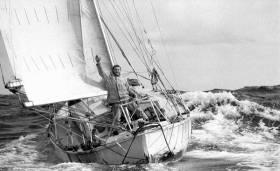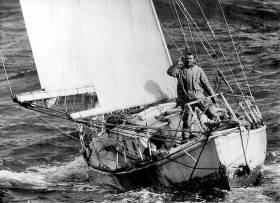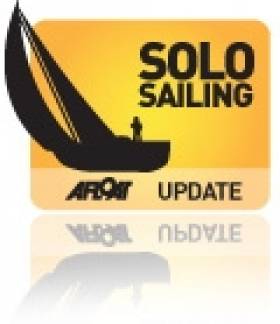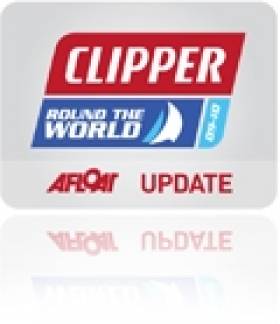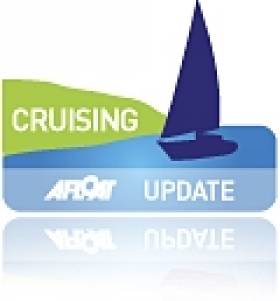Displaying items by tag: Sir Robin KnoxJohnston
22 April 2019, marks an astounding 50 years since Sir Robin Knox-Johnston, and his yacht, Suhaili, returned to Falmouth after an epic 312 days at sea, securing him in global history as the first person to sail solo, non-stop around the world.
An inspiring story of the underdog who went on to inspire the nation and a generation of ocean racers, he was written off by most before he even started and faced many challenges along his journey. From raising his own funds and building his own yacht, to facing 80-foot waves in the remote Southern Ocean, battling appendicitis, carrying out repairs in shark-infested waters, and eventually losing all radio contact. Robin was presumed lost at sea for over four months before being reported by a British tanker vessel just weeks from the finish line.
In celebration of this pioneering achievement in global sailing and adventure history, which took place during the year of the first moon landing; a programme of public celebration events will take place over Easter in Falmouth. These include a special parade of sail on Monday 22 April during which Sir Robin and Suhaili, escorted by a flotilla of support vessels, will recreate the historic moment they crossed the finish line, and returned home.
Sunday 22 April marks 49 years since Sir Robin Knox-Johnston returned to Falmouth after spending 10-and-a-half months racing solo, non-stop around the world on is yacht Suhaili to win the Sunday Times Golden Globe Race.
Sir Robin, who went on to establish the Clipper Race to enable everyday adventurers to experience the thrill of ocean racing for themselves, reflects on that historic day in 1969.
“The night of the 21 April 1969 was not a restful one for me. I was heading in towards the Lizard, aiming to round it at daybreak on the 22 April, but my route was seriously busy with a couple of hundred French fishing boats square dancing across my path. Half of Brittany seemed to be at sea off the Cornish coast.
“The last couple of days had been busy with boats full of journalists appearing from all directions and demanding comments, a huge contrast to the solitude of the previous 310 days. At times I began to wonder whether I should not turn round and slip away and carry on being what I had become after ten and a half months alone: a creature of the sea with no need for other human company.
“The night was a long one. I did not dare sleep in case a fishing boat misread my paraffin pressure lamp, which was the only navigation light I had left working. Fortunately I had two faithful escorts: Fathomer with my friends aboard, and Queen of the Isles, the Scilly ferry charted by a newspaper. Both kept close to discourage the fishing fleet.
“At daybreak I was off the Lizard and was asked when I thought I would cross the finish line off Black Rock Beacon in Falmouth. The wind was fair and 0900 seemed a sensible ETA. But this created a problem I could not have imagined. A boat closed in and yelled would I slow up please as the Mayor and Mayoress were going to meet me and the Mayoress had a hairdressers’ appointment for 0900.
“I remonstrated. All I wanted was a cigarette (I had run out 40 days before – its will power really!) a pint of bitter, a steak, (I had lived off tinned food for the whole voyage and wanted something I could chew) and a bath, in that order.
“But after all this time away from fellow humans, and as I approached the end, I was losing my usual aggressive response to any threat and I slowed down.
“It was a disastrous mistake. At 0730 a front came through, no forecasts in those days, all I had was a barometer I had stolen from a pub.
“Suhaili does not beat to windward well (neither does her owner!) and the wind was now blowing directly from Falmouth Harbour. The Mayoress had all the time she wanted for her hair appointment, in fact too much, as I did not cross the finish line until 1525 in the afternoon of 22 April, by which time her hair do had been blown away.
“I was tired after two days without sleep but now exhilarated at the thought of getting home. I managed to avoid contact (except with the BBC launch) with the fleet of boats that had come out to escort me in and headed for the finish.
“But as I crossed the finish line at the entrance to Falmouth Harbour, which I had last passed on the 14 June 1968, a large customs launch came alongside and two immaculate customs officers jumped aboard my poor battered little boat and gave the usual greeting. ‘Good afternoon, captain,’ they said, ‘where from?’
“There was only one answer. ‘Falmouth!’ I responded.”
Nine sailors started the Golden Globe race; and amid various retirements and boat breakages plus the well-documented loss at sea of Donald Crowhurst (Robin ended up donating his £5,000 prize money to a fund supporting Crowhurst’s family), Sir Robin Knox was the only entrant to complete it.
The 30,000-mile voyage in his sturdy 32ft yacht Suhaili took 312 days, and Sir Robin returned to Falmouth on April 22 1969 as a modern hero, with his achievement remaining one of the most significant small boat sailing achievements in history.
Thursday 14 June marks the 50th anniversary of the day Sir Robin departed from Falmouth on his now historic voyage. To celebrate this achievement. a special Suhaili Falmouth 50 Parade of Sail is set to take place.
The three-day commemorative event, organised by the Falmouth Town Team and the Royal Cornwall Yacht Club, promises to be quite a spectacle.
Sir Robin will sail in to Falmouth aboard Suhaili on Monday 11 June, joined by two other historic solo circumnavigators — Sir Francis Chichester’s Gipsy Moth IV, and Sir Alec Rose’s Lively Lady — together with the entire fleet of yachts and skippers who are preparing to take part in a 50th anniversary race, established in tribute to Sir Robin’s historic voyage.
The 2018 Golden Globe Race will start on Sunday 1 July from Les Sables-d’Olonne in France. In contrast to the current professional world of elite ocean racing, and even the corinthian spirit of the current Clipper Race, this tribute race is designed to celebrate the ‘Golden Age’ of solo sailing.
In a solo, non-stop around the world race, via the five Great Capes, returning to Les Sables-d’Olonne, entrants will be limited to sailing similar yachts and equipment to what was available to Sir Robin.
The challenge is pure and very raw. Competitors will be navigating with sextant on paper charts, without electronic instruments or autopilots. They will hand-write their logs and determine the weather for themselves. Only occasionally will they talk to loved ones and the outside world when long-range high frequency and ham radios allow.
It is now possible to race a monohull solo around the world in under 80 days, but sailors entered in this race will spend around 300 days at sea in little boats, challenging themselves and each other.
2018 Golden Globe Solo Non–Stop Round–the–World Yacht Race
#goldengloberace – To mark the 50th anniversary of the first solo non-stop circumnavigation under sail achieved by Sir Robin Knox-Johnston during the 1968/9 Sunday Times Golden Globe Yacht Race, a new Golden Globe Race is set to start from Falmouth UK on June 14, 2018 – the same day that Knox-Johnston set out on his epic voyage 50 years before.
The announcement today is significant, marking the 46th anniversary of Robin's victorious return to Falmouth in 1969, as the sole finisher in the original Sunday Times event.
The 2018 Golden Globe Race is very simple. Depart Falmouth, England, sail solo, non-stop around the world via the five Great Capes and return to Falmouth. Entrants are restricted to using the same type of yachts and equipment that were available to Sir Robin in that first race. That means sailing without modern technology or benefit of satellite based navigation aids. Competitors must sail in production boats between 32ft and 36ft overall (9.75 – 10.97m) designed prior to 1988 with a full-length keel with rudder attached to their trailing edge, similar in concept to Knox-Johnston's Suhaili.
Australian adventurer Don McIntyre, founder of this 2018 Race says: "The overriding aim is for a race where adventure takes precedence over winning at all costs; one where sailing skill and traditional seamanship, rather than modern technology and outside support, gets you round, and where the achievement truly belongs to the skipper."
McIntyre who completed his first solo circumnavigation in 1991 and more recently retraced Capt. Bligh's Bounty Boat voyage from Tonga to Kupang, West Timor in a similar open boat with minimal rations. He intends to compete in the Race with his Tradewind 35 Betty, one of 13 traditional production yacht types approved for this race.
Another entrant is British yachtsman and adventurer Chris Jacks from Liverpool. Last Autumn, he climbed the summits of 92 Wainwright mountains within 40 days – equivalent to climbing Mount Everest twice.
Two more sailors, one from Australia, the other from Germany, have so far expressed keen interest to compete and are currently finalising their plans. The 2018 Race is limited to a maximum of 20 entrants.
The challenge is pure and very raw for those who 'dare', just as it was for Sir Robin, navigating with sextant on paper charts, without electronic instruments or autopilots.
Sir Robin Knox-Johnston says: "I'm a great believer in the freedom of the individual. I think this race is a great idea, giving an opportunity for those who want to do something special with their lives. You can enter this race in an ordinary seaworthy boat and know that success will be down to personal drive and determination, and not to the biggest budget. I intend to be at the start with Suhaili to celebrate this anniversary and expect to be joined by two other yachts that competed in the original Sunday Times Race."
A prize purse of £75,000 has been budgeted for the 2018 Golden Globe Race, and all who finish before 15:25hrs on 22nd April 2019 (the anniversary of Sir Robin Knox-Johnston's finish) will receive a Suhaili trophy and a refund of their entry fee.
Sailing legend Sir Robin Knox-Johnston has announced a brand new fleet of 70-foot racers for the Clipper Round the World Yacht Race.
Top naval architect Tony Castro has been commissioned to design the Clipper 70 fleet that will compete in the race from 2013 onwards.
The new yachts, to be built in China and fitted out by international suppliers, will have an increased crew capacity of 22, and feature a new hull design optimised for performance that should see speeds increase to more than 30 knots in the right conditions.
Other features include twin helms, twin rudders and a six-food bowsprit which will allow for the use of a huge Code Zero sail to complement the Yankee headsails, staysail and mainsail.
The Clipper Round the World Yacht Race is open people from all walks of life regardless of previous sailing experience.
In its 15-year history the race "has changed people’s lives and turned almost 3,000 sailing novices into experienced ocean racers", according to Knox-Johnston.
Clipper Ventures chief excective William Ward added: "Crew places on the last race sold out well in advance and Clipper 11-12 is set to do the same. We will therefore be using the 2011 London International Boat Show to launch our crew recruitment drive for Clipper 13-14 and beyond.”
The Clipper 11-12 race - the last to feature the Clipper 68 sailing the 40,000-mile (64,000 km) round-the-world course - will commence this August.
Cruising Association Delighted Members Paul and Rachel Chandler are Safe
The Cruising Association is delighted that members Paul and Rachel Chandler are safe after their ordeal and hopes that they will soon be reunited with friends and family.
President Stuart Bradley says "It has been a truly awful ordeal for Paul and Rachel. They have conducted themselves with extraordinary dignity and bravery in very harsh conditions throughout the 388 days of their capture. The Cruising Association has kept in close touch with representatives of their family throughout and followed their wishes. Many letters of support from Cruising Association members have been forwarded to them. In many instances those letters have been acknowledged personally by family members. I received messages from Paul's sister Jill Marshment, and Rachel's brother Stephen Collett shortly after 6.30 am today informing me of their release but requesting no publicity until Paula and Rachel were safely out of Somalia. I would like to thank the press and news media for showing restraint in covering this story. Soon after Paul and Rachel's capture we were advised that publicity only encourages hostage-takers to believe their ransom demands would be met and that it would delay the release of Paul and Rachel Chandler. We have maintained silence until now in order to support the various attempts to secure their release. We are now free to speak."
Like many thousands of CA members the Chandlers are simply leisure sailors. They left the UK to realise their dream of sailing around the world. That dream turned to a nightmare when, in international waters 600 hundred miles from Somalia, they were taken captive by pirates and held to ransom. Peggie Manton, Secretary of the CA's Mediterranean Section knows the Chandlers well having spent many months sailing with them in the Mediterranean. Peggie says "We are all thrilled at the news that Paul and Rachel have been released and we can't wait to see them safely back home. We can only guess at what they have had to endure but they have come through it bravely and we are all very proud of them."
Cruising Association Patron, Sir Robin Knox-Johnston CBE says "I am very pleased to hear that Paul and Rachel are safe. It has been a truly dreadful time for them and we look forward to welcoming them back home. I, in common with all of the Cruising Association's members, have been waiting for this news and we cannot say how pleased we are to hear that they are at last safe and will shortly be on their way home. The growing threat of piracy is something all governments must work towards combating."
Stuart Bradley, CA President says "We work closely with the UK Ministry of Defence, the Foreign and Commonwealth Office and The Maritime Security Centre (Horn of Africa) part of the EU Naval Force, to reduce the risk of piracy to innocent yachtsmen. We will continue to do everything we can to make the seas safe for everyone who wants to sail on them. There is a crying need for international intervention to deal with the background issues in Somalia, and the problem of piracy in that area is not likely to be resolved until stability and a sound economy can be introduced."
Knox-Johnston in Search for Ten Skippers
Sailing legend Sir Robin Knox-Johnston has launched his latest search for ten exceptional skippers to lead the internationally sponsored teams in the next edition of the Clipper Round the World Yacht Race. Clipper 11-12 will start form the UK in August next year and on board the matched fleet of stripped down 68-foot ocean racing yachts will be teams of novice crews representing all walks of life. The only professional sailor on board, the skipper has the challenge of turning such a diverse mix of people into a finely-honed racing team and it's one that professionals understand can deliver valuable benefits to their CV.
Sir Robin says, "Tackling this unique challenge, with its roaring gales and towering seas, as well as the frustrations of tricky calm spells, is no mean feat. The skippers we are looking for need to be up to the challenge of competitively racing our 68-foot yachts around the world with a non-professional crew onboard.
"The successful individuals must have the ability to draw the line between competitiveness and safety, whilst also motivating a sometimes exhausted crew into an enthusiastic and committed team.
"Leading a team of novice sailors in a race around the world is one of the hardest and most challenging jobs that any skipper could ever undertake and not everybody is up to this challenge."
Successful candidates will skipper one of the Dubois designed Clipper 68s and must also have an understanding of the commercial and media demands of this high-profile global event which can help launch a skipper's career.
The youngest skipper to win the Clipper Race was Alex Thomson who was just 25 when he led a team in the 1998 edition of the race. Twelve years later and Alex is getting his brand new IMOCA Open 60, Hugo Boss, ready for the double-handed Barcelona World Race which starts in December. The Gosport based sailor is widely considered to be one of the UK's top solo ocean racers and once he has returned for the Barcelona World Race he will be hoping to fulfil his dream by becoming the first non-Frenchman to win the Vendee Globe.
Other Clipper skippers who have gone on to secure sponsorship for solo ocean racing include Hannah Jenner who skippered in both the Clipper 07-08 and 09-10 Races. Hannah will be taking part in the Global Ocean Race next year, a 30,000-mile double-handed race around the world. Similarly Clipper 09-10 skipper, Chris Stanmore-Major is about to set off on his 2,500-mile qualifying passage for the VELUX 5 OCEANS race onboard his Open 60 Spartan having secured sponsorship to take part in what is deemed to be 'The Ultimate Solo Challenge'.
Interested skippers need to have the correct level of qualifications, including an MCA approved Ocean Yachtmaster. They need to be excellent sailors who put seamanship and safety first, have a proven track record in sail training and can demonstrate that they are strong team leaders.
Clipper Race Director Joff Bailey, skipper of New York in the Clipper 05-06 Race, says, "Being a race skipper in the Clipper Round the World Yacht Race was one of the hardest jobs I have ever done. However, the reward and satisfaction when you see the crew that you have trained react to situations as though they were full-time professionals and the look of achievement on their faces when they have crossed an ocean and finished a race, is the best high in the world."
If you think you are up for the challenge and have the right characteristics and experience contact Sir Robin by email on [email protected] to request an application form.



























